Assistant, Associate or Full Professor: Nursing (Regina Campus)
Health Careers in Sask
Regina, SK-
Number of positions available : 1
- Salary To be discussed
- Published on December 31st, 2024
-
Starting date : 1 position to fill as soon as possible
Description
Position #: Assistant, Associate or Full Professor: Nursing (Regina Campus)
Expected Start Date: July 1, 2025
Union: URFA - University of Regina Faculty Association
Facility: University of Regina, Regina Campus
City/Town: Regina, SK
Department: University of Regina, Faculty of Nursing
Type: Tenure Track
FTE: 1
Shift Information: n/a
Hours of Work: Varied (Days/Evenings/Weekends/Nights) to provide student learning support and guidance.
Relief: No
Float: No
Field Hours: No
Salary or Pay Band: Faculty Assistant Professor - As per URFA Collective Agreement
Job Description:
The Faculty of Nursing, University of Regina, invites applications from qualified individuals for a full-time, tenure-track Assistant, Associate, or Full Professor position at our Regina campus. The salary is competitive and commensurate with professional experience and qualifications. The start date is negotiable but typically commences on July 1.
The successful candidate must have excellent communication skills, comprehensive knowledge of nursing practice, and a demonstrated commitment and enthusiasm for teaching, including student advising. Successful candidates will be expected to use a variety of teaching modalities, including offering courses in practice education settings, labs, and seminars.
Applicants will have at least two years of recent and relevant practice experience in their specialization.
Reading
- Read and understand written documents (charts, orders, flow sheets, graphics)
- Read digital displays
Math
- Comprehend and interpret graphic trends
- Calibrate equipment
- Convert to and from the metric system (dosage calculations)
- Tell time
- Measure time (CPR, contractions)
- Count rates (drip rates, pulse)
- Read and interpret measurement tools (measure tapes and scales)
- Add, subtract, multiply, and divide
- Compute fractions and decimals (dosage calculations)
- Document numbers in records using a computerized database
Emotional Stability
- Establish professional relationships
- Provide emotional support (students, patients and families)
- Adapt to changing environments/stress
- Deal with the unexpected (student reactions, patient crash, death, etc.)
- Focus attention on the task
- Cope with your own emotions
- Multitask
- Cope with strong emotions in others (students, family grieving, patient upset, etc.)
Analytical Thinking
- Transfer knowledge from one situation to another
- Process and interpret information from multiple sources
- Analyze and interpret abstract and concrete data
- Evaluate outcomes
- Problem-solve
- Prioritize tasks
- Use long-term memory
- Use short-term memory
- Synthesize knowledge and skills
- Sequence information
- Independent decision making
- Adapt decisions based on new information
Critical Thinking
- Ask questions
- Gather relevant information
- Think through solutions and conclusions
- Consider alternative systems of thought
- Communicate effectively
- Admit when wrong or when they don’t know the answer
Interpersonal Skills
- Establish rapport with students, families, patients, and healthcare team
- Respect/value cultural differences
- Negotiate interpersonal conflict
Communication Skills
- Teach (patient and family)
- Influence people
- Direct/manage/delegate activities to others
- Speak in English
- Write in English
- Listen/comprehend spoken/written work
- Collaborate with others
- Manage information
Gross Motor Skills
- Maintain balance in multiple positions
- Reach above shoulders/overhead (IV poles, monitors, etc.)
- Move within confined spaces
- Reach below the waist (electrical plugs, etc.)
- Reach in front (assist the patient with arms out)
Fine Motor Skills
- Pick up objects with hands
- Grasp small objects with hands (IV tubing, pencils, electrode patches, etc.)
- Write with a pen
- Use a computer (type)
- Pinch/pick or otherwise work with fingers (use a syringe, etc.)
- Twist at the waist
- Twist wrists/hands (turn objects/knobs using hands)
- Squeeze with fingers (eye droppers, bulb syringes, ear bulbs, etc.)
Physical Endurance
- Walk long distances (transfer patients, etc.)
- Stand (at the patient’s side during surgery, therapeutic procedure, etc.)
- Sustain repetitive movement (CPR compressions, bagging, etc.)
- Maintain physical tolerance (stand/walk/work on your feet for 8-12 hours at a time with minimal breaks)
Strength
- Push and pull 50 pounds (position patient, move equipment, etc.)
- Support 50 pounds of weight (ambulate patient, assist to bedside toilet, etc.)
- Lift 50 pounds (pick up a child, transfer a patient, etc.)
- Carry equipment/supplies
- Use upper body strength (CPR, physically restrain patient, etc.)
- Squeeze with hands (operate fire extinguisher)
Mobility
- Twist
- Bend
- Stoop/squat
- Move quickly (respond to emergency)
- Climb stairs
- Walk
- Stand
Hearing and Visual
- See information up to 24 inches away (monitors, computer screens, skin conditions)
- See objects up to 20 feet away (patient in the room)
- Use depth perception
- Use of peripheral vision
- Distinguish colour and colour intensity (flushed, as coloured, or pale skin, colour of labels)
Tactile and Smell Textile
- Feel vibrations (pulses)
- Detect temperature (temperature of skin, IV solutions, etc.)
- Feel differences in characteristics of skin (rash, turgor, etc.)
- Feel differences in sizes, and shapes (palpate veins, body landmarks)
- Detect environmental temperatures
Smell
- Detect odours (drainage, alcohol, smoke, gasses, etc.)
Environment
- Tolerate strong soaps
- Tolerate strong odors
- Tolerate disturbing sounds (vomiting, diarrhea, coughing from trach)
Travel Required: Some travel required
Human Resources Exemption: No
Education
- A PhD is required. A minimum of one graduate degree in Nursing is preferred and the ability to practice as a nurse practitioner will be considered an asset.
Licenses
- n/a
Other Education and Training
- Applicants must be registered and have an unencumbered practice registration with the College of Registered Nurses of Saskatchewan and have certification in CPR, TLR, and be mask fit tested.
Other Information
- The University of Regina is committed to an inclusive workplace that reflects the richness of the community that we serve. The University welcomes applications from all qualified individuals, including individuals within the University’s employment equity categories of women, persons with disabilities, members of visible minorities, Indigenous persons, individuals of diverse gender and sexual orientation and all groups protected by the Human Rights Code.
Contact: nursing.dean@uregina.ca
Requirements
undetermined
undetermined
undetermined
undetermined
Other Health Careers in Sask's offers that may interest you



